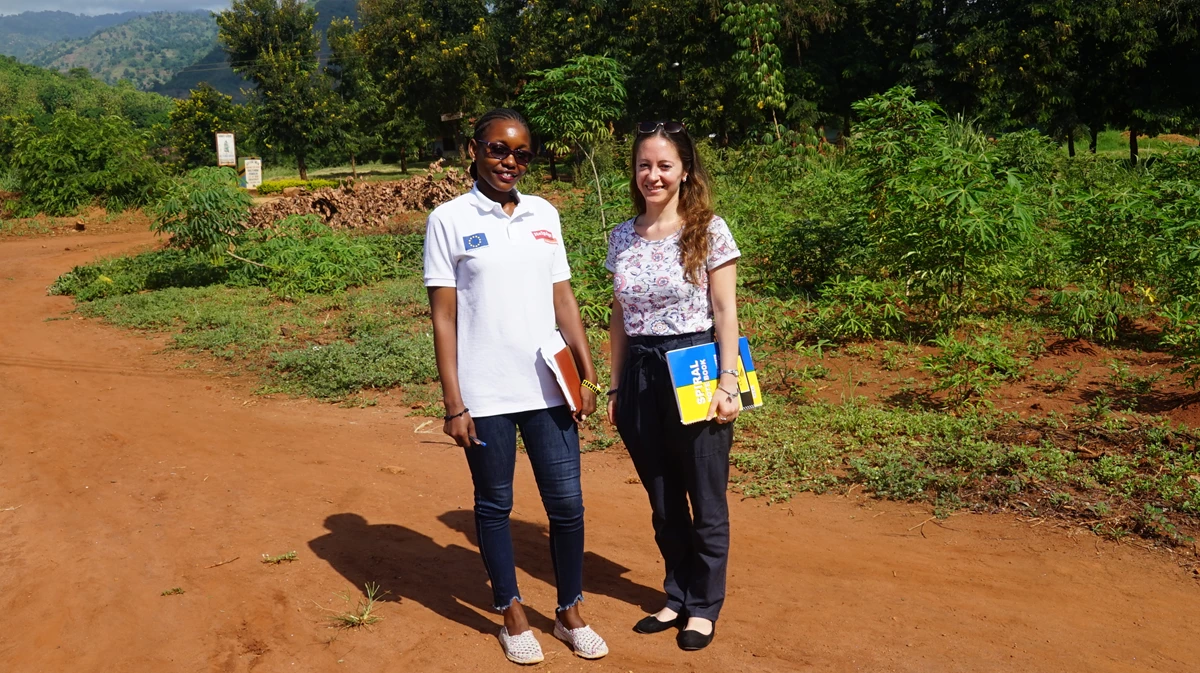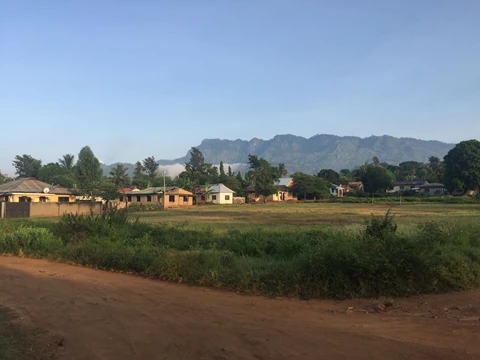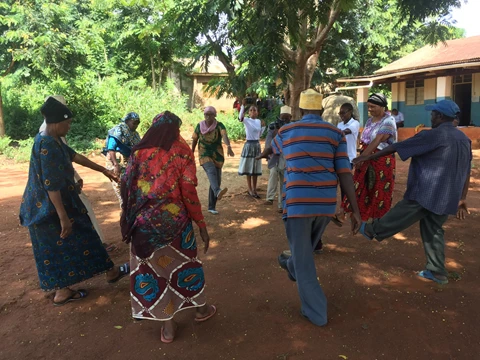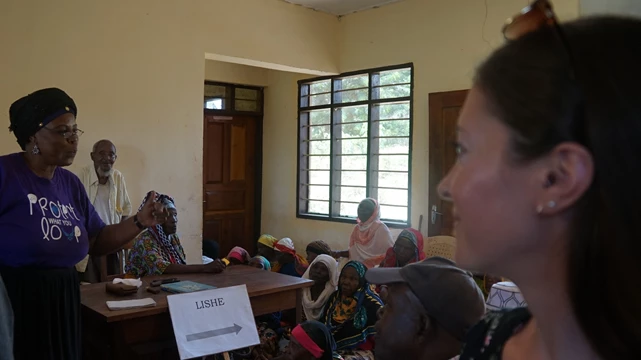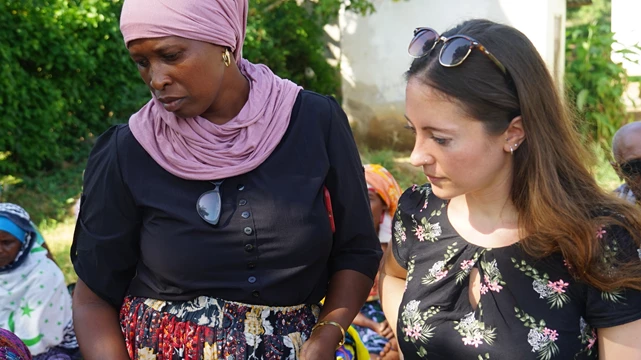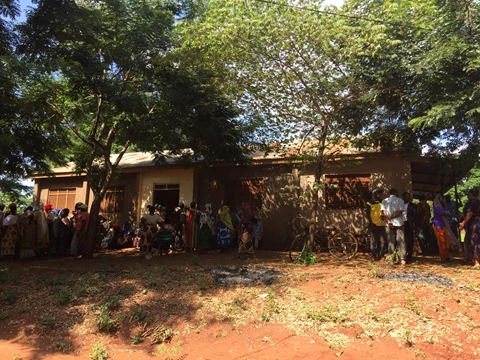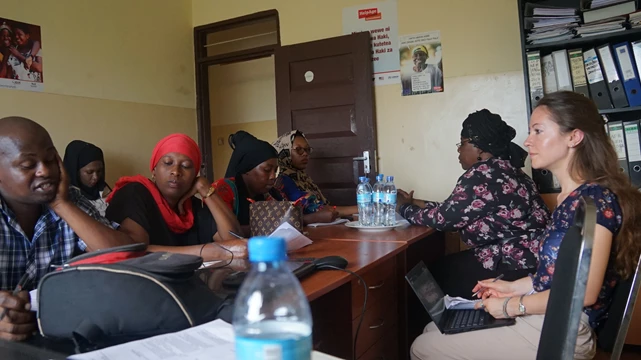Internship Reflections - January 2021
It’s safe to say that when I began my internship in July 2019, I couldn’t possibly have imagined the way in which it would have panned out. Like many others, my plans to travel and work overseas (or indeed travel further than my front room) were scuppered! As a consequence I was fortunate to have my internship extended by 6 months in an attempt to ensure that an overseas placement could occur. Although this didn’t end up being possible, I was very lucky to have been able to get out to Tanzania for a couple of months at the beginning of 2020, and even my short time there was an incredibly valuable experience. It gave me a crucial insight into the realities of implementing and evaluating programmes in the field. Moreover, this change of plans brought with it a silver lining; by extending my time working for the HelpAge London office, I was able to strengthen my connections with colleagues there and properly integrate into the team. I also had the opportunity to put to use the skills and perspective I gained during my time in the field, as well as becoming involved in several innovative and exciting HelpAge projects. This experience was hugely beneficial in allowing me to consolidate my skill set and focus more closely on the areas of work that I am most interested in.
It’s no easy feat to summarise my experience in a short blog entry, because I’ve been fortunate to be involved in so many varied and fascinating pieces of work, ranging from project evaluations to policy and advocacy. At Jersey Overseas Aid, I supported the development of a sustainability workshop for the Commonwealth Women’s Parliamentary Association and also learned about the review and selection process for humanitarian and development funding applications. In Tanzania, I had the opportunity to travel across the country and interview the people who are benefiting from HelpAge’s JOA funded health programmes, as well as speaking to local government officials about HelpAge’s health outreach work there. At HelpAge HQ in London, I actively engaged in the organisation’s Gender, Humanitarian, Health and Rights programmes, developed advocacy tools, mapped donors, supported the development of project inception reports and budgets, and gained valuable experience in project design and delivery.
Perhaps most significantly, after returning from my overseas placement in Tanzania I re-joined the London office in the midst of the implementation of their global COVID-19 emergency response plan. Over the past year, HelpAge has been coordinating with local partners to deliver basic and life-saving services such as hygiene kits, food and medicine, as well as ensuring that older people have access to healthcare services on an equal basis with other age groups. I became involved in several aspects of HelpAge’s global COVID response, including supporting the development of needs assessments reports, technical guidance notes and a global research project addressing the impact of the pandemic on older people in middle and low-income countries. This part of my internship has been both extremely rewarding and valuable in terms of my understanding of humanitarian response. I feel proud of the work that I’ve achieved at HelpAge and it’s a great feeling to know that some of the projects I’ve helped deliver will contribute to mitigating the impact of the pandemic on marginalised groups.
I am extremely grateful for the professional development opportunities that the internship has provided me with, as well as the connections and friendships that I made during my time on the scheme. But despite my sadness at moving on, exciting things lie ahead, and I’m thrilled to be starting a new role with an international development consultancy organisation called Options. I look forward to applying the skills I’ve learned to the exciting work that Options is doing to transform the health of women and girls in developing countries.
I come away from my internship feeling inspired and invigorated by the experience and by the wonderful people that I’ve met along the way. I’m excited for this new chapter and the chance to continue to develop my career in the sector. And whilst the foreseeable future for me is looking to be filled with Zoom calls and remote working, I’m eagerly anticipating the time when I can travel and work overseas, and use the skills I’ve developed to contribute to humanitarian and development projects in the field.
Karibu, Tanzania! - March 2020
Welcome to Tanzania! I arrived in Dar es Salaam just under 2 months ago – although it feels like a lot longer, given all that has happened since! The past 7 weeks have been a whirlwind of new places and faces. I’ve been busy getting to know the local HelpAge team, learning about the projects they’re implementing, getting my head around the local culture and language, and searching for a place to stay. I spent my first few weeks staying in various hostels and Airbnbs whilst I found my bearings and explored the city. I eventually found an apartment not far from the HelpAge office, shared with some other expats also working in the development sector. My placement hasn’t turned out quite as expected, but I’ve very much enjoyed calling Dar es Salaam home for the past two months and am excited to share my experiences with you…
My first impression of Dar es Salaam was that it’s a vibrant and bustling city. Dar is the former capital, and Tanzania’s commercial and cultural hub. It is also one of the fastest growing cities in the world. Once a sleepy fishing village, it’s now a vast and sprawling city, notorious for its busy roads and traffic jams. Despite this, the city somehow manages to maintain a laid-back and friendly feel – in fact, the locals themselves claim that Tanzania is the most welcoming country in Africa! Since Tanzania is the only African country I’ve visited so far, I’ll have to take their word for it, but I can fully see why it might warrant this reputation!
As a low-income country, Tanzania faces many social and economic challenges. Despite improvements in economic growth, 25 million Tanzanians (almost half the population) still live on less than $1.90 a day, and government efforts to expand access to social services like education, health and water have been undermined by a rapidly increasing population. The older population in Tanzania (those aged 60+) is particularly vulnerable as a result of these limited social services; just 4% of older people in Tanzania receive a pension, forcing many to continue working into old age. Many also struggle to access adequate healthcare; although public health facilities are supposed to provide free health services and medication to older people, drugs are often out of stock and older people often struggle to get seen. HelpAge in Tanzania works hard to ensure that the rights of older people are respected, and that they have access to the services they are entitled to.
A couple of weeks ago, I went on my first project visit to Korogwe in Tanga region – about a 6-hour drive from Dar es Salaam. Tanga is one of the two regions in which HelpAge are implementing the Jersey Overseas Aid funded project which aims to improve the health and well being of 25,100 older people, including those with disabilities. To put the projected impact of this project into perspective, 25,100 is roughly equivalent to the entire older population of Jersey! The purpose of our visit was to assess the project’s progress and to speak to the older people who were directly benefiting from the project’s activities. This would help us to gauge the impact the project was having and identify any challenges and gaps that need to be addressed going forward. HelpAge is committed to championing the voice of older people and educating them on how to stand up for their rights. Consultation with older people is crucial in order to design effective projects.
During the trip, we attended an outreach health check which was providing disease-screening and treatment referral for older people who are unable to access health clinics and medical services. This may be due to a disability or mobility issue that makes accessing health services impossible, or otherwise lack of funds to pay for transport to get there. Speaking to the older people in attendance, it is clear to see how crucial these services are to the local community. An older woman explained to me that, following her stroke, she is very much dependent on health outreach activities organised by the JOA project, as the health centre is very far from here and it is too expensive to get there.
We also participated in one of HelpAge’s Active Ageing Clubs. These clubs were established to encourage older people to engage in self-care and healthy ageing activities, and to educate them on the importance of exercise and good nutrition. Despite the challenges facing the older people in this region, it was heartening to see the tangible impact that this Jersey-funded project is having on the lives of the older population in Korogwe. It is also exciting to see the enthusiasm and commitment amongst the older population and local government officials to make these services sustainable in the long term.
Currently, HelpAge is working hard to respond to the COVID-19 pandemic by adapting its project activities to best deal with the crisis and, as far as possible, reduce the impact on older people. The older population is particularly susceptible to the virus because of their weakened immune systems and increased propensity for underlying health conditions. Those older people with little access to food, water and health care are particularly at risk, and if the pandemic takes hold in low- and middle-income countries such as Tanzania, countless lives will be lost. In this context, it’s a good time to reflect on the valuable work that HelpAge’s projects are doing to bolster health services, combat age discrimination and improve income security which, in times of crises such as this, is more significant than ever.
I’ve spent a fascinating couple of months learning about HelpAge’s work in Tanzania and have been exposed to some brilliant learning opportunities. Unfortunately, due to the current situation, I’ve had to return home for the time being. The decision was a difficult one to make, but with the uncertainty of the coming months, it made sense for me to come back to Jersey. For the next couple of months, I’ll continue to work for HelpAge remotely, but hope to return to Tanzania as soon as possible.
En Route to Tanzania - January 2020
This next blog entry comes to you from 35,000 feet in the air! With a 10 hour flight ahead of me to Tanzania – where I’ll embark upon the next stage of my internship, it seems as good a time as any to reflect on all that I’ve learnt during my last couple of months at HelpAge’s London office.
When I started at HelpAge in October, I was thrilled to be presented with the opportunity to get involved in a variety of different projects and tasks. Similarly, the latter half of my time with the London team has provided me with valuable opportunities to learn about the work of the organisation and hone my skills. As I mentioned in my previous blog entry, I’ve been providing support to HelpAge’s Global Gender Advisor on the development of a workshop on gender mainstreaming. Gender mainstreaming is a strategy for promoting gender equality, by ensuring that gender perspectives are central to all activities – policy development, research, advocacy/ dialogue, planning and implementation of projects. The objective of this workshop was to provide training to a select number of HelpAge staff, in order that they would in turn promote gender across the organisation’s work, and support their teams and colleagues to do the same. I had the chance to attend one of these workshops where we learned how to integrate gender analysis into programme design, funding proposals and advocacy messaging.
I’ve also recently been doing some work for HelpAge’s Social Protection Team. HelpAge passionately supports social pensions for people in the developing world, as they provide secure incomes and help protect against financial destitution in older age. Despite the importance of social pensions in alleviating poverty, only one in four older people in middle and low income countries receive a pension. HelpAge works closely with governments and partner organisations to design and implement pension schemes. In order to support this work, I undertook a research based task involving a review of various different social pension impact studies in lower and middle income countries. The point of this task was to begin to build up an overview of the existing evidence base on social pensions; evidence which may then be used to inform program design and advocacy messaging.
Additionally, January has been a particularly interesting time to be in the HelpAge office, as the organisation finalised the development of its new ten year strategy, identifying the HelpAge’s vision and outlining the areas of work on which it’ll focus over the coming decade. I also had the opportunity within the two teams I have been working with (Advocacy and Policy) to sit in on and contribute to the business planning meetings for 2020.
My last couple of weeks in London have been a whirlwind of visa applications, travel vaccinations, wrapping up the projects I’ve been working on in the UK office and saying goodbye to the friends I made at HelpAge. Leaving HelpAge London was somewhat bittersweet – I felt quite settled and very much part of the team there. I had also been involved in such a variety of interesting work – it was a little hard to detach! I was given a lovely send off by the team there – complete with cake and leaving gifts (including a head torch which I’m told will come in handy in Tanzania, as they’re prone to the odd power cut!). So for now, it’s goodbye to London, and goodbye to the lovely team at the UK office! I’m looking forward to embarking upon what I expect to be the most exciting (if not somewhat challenging) part of my internship – my overseas placement! I’m excited to take the knowledge and skills that I’ve learnt so far and apply these to the organisation’s work in Tanzania, where I hope to gain valuable on-the-ground experience of project implementation.
As I sign off, it’s now T-5 hours until I touch down in Dar-es-Salaam and begin this next chapter! I’ll check back in a couple of months to update you on my time in Tanzania.
HelpAge HQ - Novemeber 2019
It’s been two months since I arrived at HelpAge International’s UK office, and so far I’ve been kidnapped, shot at and faced an IED explosion! I should mention that this was during a simulation as part of my Hostile Environment Awareness Training (HEAT) course, but still, it’s been pretty action packed!
The aim of the HEAT course is to provide first aid and security training for people travelling overseas to work in potentially hostile or challenging environments and it is a requirement for all HelpAge staff undertaking such a placement. Therefore, a couple of weeks ago, I hopped on the train and headed up to Kettering in Northamptonshire, where I spent four days at the HEAT training centre along with a group of thirty other NGO workers preparing to travel overseas.
The first couple of days on the course were classroom based and covered a variety of different topics including: first aid, vehicle and travel safety, and how to respond to security risks such as civil disorder, hostile border checkpoints, kidnapping and hostage taking.
On the third day came the challenging part; a simulation of several scenarios designed to put the skills we’d learned to the test. Our mission was to travel to a refugee camp in a conflict-torn nation in order to assess their humanitarian needs. We were divided into teams of five; each team tasked with completing a risk assessment and designing a plan to ensure the safe and successful completion of the assignment. Early that morning, armed with our first aid kit, a radio and plenty of waterproof clothing, we jumped into a 4×4 and headed off into the Northamptonshire wilderness, where, throughout the day we encountered several (rather terrifying!) situations. The simulations included; an IED explosion, an active shooter situation and a kidnap, amongst others. The actors were brilliant, and the explosions and injuries were very realistic (no shortage of fake blood and gruesome prosthetic wounds!). The course carefully trod the line between creating a frightening and adrenaline-filled experience and providing us with the opportunity to learn from our mistakes in a safe environment.
My four days in Kettering were challenging, but extremely rewarding. I met an incredible bunch of people working in a variety of different areas across the charity sector and it was very valuable to learn from other people’s experiences in the field. It was also very humbling to meet people who have spent time contributing to humanitarian relief efforts overseas, risking their lives to provide life-saving support to communities affected by crises. While I’m hopeful that most of the skills I’ve learned won’t have to be put into practice, I now feel much more confident in my ability to deal with any travel security risks.
In addition to this training I’ve also been involved in one of HelpAge’s biggest campaigns of the year #ExposeAgeism. In many countries it is considered acceptable to deny older people their rights just because of their age. The campaign wanted to expose this and show how ageism negatively impacts our rights and opportunities as we get older. Older activists across the world organised a variety of events in their communities to get people talking, to challenge ageism and to influence decision-makers. These included marches, workshops, flash mobs, government lobbying and plays that explore the theme of ageism. It was brilliant to be able to support these campaign activities and learn about the work of campaigners across the world, advocating for the rights of older persons and calling on governments and societies to take action.
I’ve also had the opportunity to support on several other interesting projects; including preparation of a research report on funding for international campaigns, mapping of HelpAge’s global advocacy decision-makers and influencers, support to the Global Violence & Gender Advisor on preparing for a gender training workshop and the preparation of a report to the UN Economic and Social Council.
My time in London so far has flown by, and over the next couple of months I’ll be starting to plan for my placement overseas. To hear about the second half of my internship in the London office and follow my preparations for Tanzania, check in at the end of January.
Introductions - August 2019
I can’t quite believe that a month has passed since my first day on the Jersey Overseas Aid Internship Scheme! I excitedly accepted the position of JOA intern back in May, and ever since, had been eagerly awaiting the beginning of my internship and what I hope will be an invaluable year of learning and development, that’ll help launch my career in the international development sector.
To provide a little background; over the course of the year long internship scheme, I’ll spend two months in the JOA office, four months in the London office of INGO HelpAge International, then 6 months in a HelpAge office in a developing country, where I’ll have the opportunity to gain valuable experience working on one of their international projects. HelpAge is a wonderful charity that works to promote the well-being and inclusion of older women and men in low and middle-income countries by advocating for changes in the behaviours and attitudes of individuals and societies towards old age. HelpAge International’s network spans 75 countries and they currently partner with JOA on a project in Tanzania, with the goal of improved health and well-being for older men and women.
When applications for the internship scheme opened a couple of months ago, I jumped at the chance! After graduating from university I spent a couple of years working overseas, teaching English with the British Council in China and India. Following this, I returned to the UK determined to pursue a career in international development. However, despite being fortunate enough to land a job in a London-based INGO, I found that I didn’t have the work experience or qualifications I needed to progress my career further. The international development sector can be a tricky one to break into and I found myself caught in the so-called ‘entry level catch-22’ – unable to get an entry-level job without work experience, but requiring work experience to apply for my first job! For this reason, the JOA internship represents an incredible opportunity; it provides the chance to gain essential experience that’ll help you get your foot in the door and exposes you to a variety of areas of development work in order to help you to decide what aspect you are most interested in/best suited to.
After receiving a warm welcome to the JOA office, my first week was spent getting to grips with the workings of the organisation and JOA’s relationship to its partner charities. In addition to learning about the long-term development and emergency humanitarian projects that JOA are currently funding, I also had the opportunity to attend several meetings with key JOA stakeholders and partners. By day two, I’d already had the opportunity to meet the JOA Commissioners and Minister for International Development – quite the itinerary for my first week! I also attended an interesting event on Impact Investing, aimed at encouraging sustainable investments amongst the Jersey Finance community. This topic is relevant to the work that JOA is currently undertaking on financial inclusion in developing countries.
I’ve joined the JOA team at a really interesting time. This year, in order to become a more effective donor, JOA has decided to concentrate its development funding in three main programme areas – financial inclusion, dairy and conservation livelihoods, and to narrow their group of target countries. They are in the process of building a strategic plan around these programme areas and I have been given the opportunity to support the JOA policy officer, Hilary, in mapping the development context, governmental strategies and donors of these target countries. Therefore week two saw me scrambling to recall what I’d learnt about research and report writing at university – skills that had been in hibernation since I graduated several years ago!
During week three, I continued with my research project into JOA’s priority countries. I’m enjoying having the opportunity to sink my teeth into a long-term research based project, and feeling as though I’m contributing to the work of the JOA team in a meaningful way, as opposed to just being given busy work – which can sometimes be the case with an internship! In addition to this research task, I also learned how to review project reports and budgets. I assisted the Project Officer, Ed, with the report review for one of JOA’s multi-year projects with partner charity CAFOD, which aims to improve sustainable farming methods in indigenous communities. This task was challenging, but provided me with a good understanding of project reporting requirements and proved how beneficial it is to gain work experience from the perspective of a donor organisation, as well as an NGO.
Week four brought with it some interesting new learning opportunities, as I forayed into the world of JOA comms and assisted in putting together the social media strategy for 2019-20. I also got involved in reviewing some JOA bursary applications and attended a presentation by two Jersey residents, both recipients of the JOA volunteering bursary, who had recently come back from volunteering in Zambia at a school. I’ve particularly enjoyed learning about the work that JOA does to support the local population in their aspirations to volunteer overseas.
With several more exciting projects/events on the horizon, I’m excited to continue my journey with JOA and HelpAge. I look forward to keeping you updated over the course of the year, and sharing my experiences in London and beyond! I’ll update this page with a new post at the end of October, so if you’d like to find out more about my internship, watch this space!!


